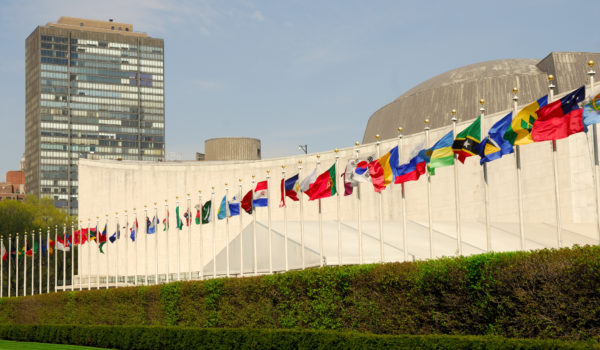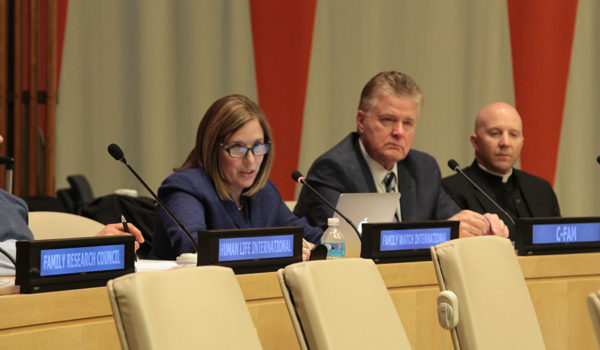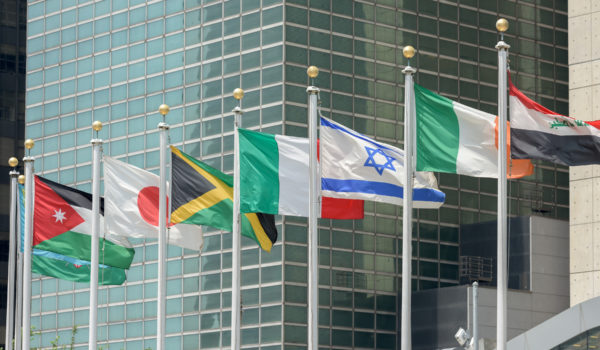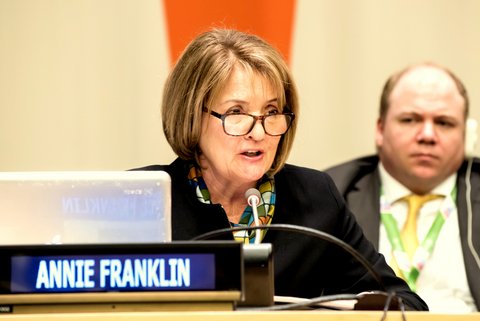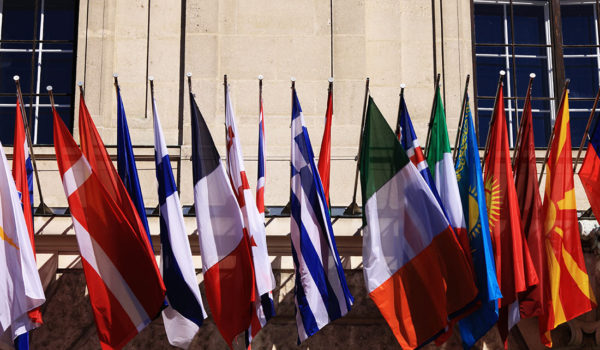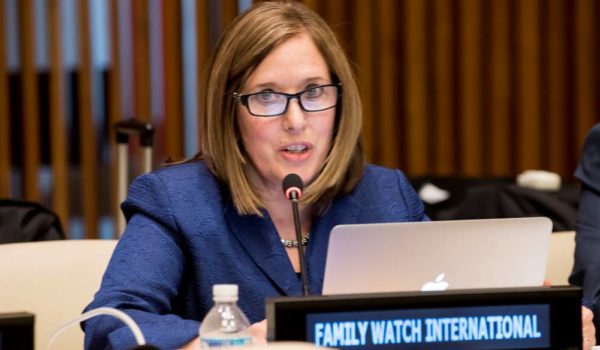United Nations Program
As a non-governmental organization in consultative status with the Economic and Social Council of the United Nations, Family Watch works at the UN and in countries around the world advocating for the protection of the family. Family Watch is recognized as a leading organization in effecting pro-family policies in negotiated UN outcome documents.
A recent report, “Rights at Risk,” identified Family Watch as one of the seven most influential organizations in the world in advancing pro-life and pro-family policies and in thwarting the radical sexual rights agenda at the UN. Interestingly, this report comes from a coalition of some of the most powerful organizations, including some with multi-billion dollar budgets that support and develop policies that undermine the traditional family.
Why are they so concerned with Family Watch, what is our UN program, and why is it so effective?
UN DELEGATE TRAINING:
Family Watch hosts highly successful Global Family Policy Forums annually, bringing together key UN ambassadors and delegates for expert presentations and discussions on family issues. These Forums have been recognized by UN diplomats, major media outlets and other observers for having a direct impact on UN negotiations in favor of the family.
UN FAMILY RIGHTS CAUCUS:
Family Watch co-founded and currently chairs the UN Family Rights Caucus (UNFRC), a widely respected and highly effective coalition of pro-family advocates and organizations, representing more than four million people across the globe. As the “Rights at Risk” report recognizes, the Caucus is “dedicated to defending and protecting the traditional family at the UN” and “has been keenly involved with the recent rise of ‘protection of the family’ resolutions at the UN Human Rights Council.” The Caucus website, created by Family Watch at UNFRC.org, highlights UNFRC’s pro-family UN statements and activities. Caucus membership is open to all who support the protection of the family.
TRAINING OF AND PARTNERING WITH OTHER NGOS:
Family Watch trains civil society leaders around the world on how to successfully address controversial issues such as abortion, homosexuality, gender confusion, comprehensive sexuality education, and other issues affecting the family.
UN LOBBYING:
Family Watch lobbies at the UN in its own capacity, through the UN Family Rights Caucus, and with NGO partners. Our seasoned family advocates, with almost 20 years of UN experience, lead teams of volunteers, to promote pro-family resolutions or amendments at the UN, and to oppose international measures that undermine or weaken the family.
FAMILY LEADERSHIP SUMMITS:
Family Watch holds closed-door events for other NGO leaders from around the world, equipping them with pro-family language, tools, and strategies on emerging issues of concern. These summits are designed to help pro-family leaders protect the institution of the family in their respective countries.
HOSTS UN EVENTS AND CROSS REGIONAL COLLABORATION:
As the “Rights at Risk” report noted, FWI actively works with governments across religious and political boundaries to sponsor special events at the UN to educate Member States on emerging family policy issues. Family Watch also collaborates with regional UN voting blocs and with the “Group of Friends of the Family” voting bloc of UN Member States to advance pro-family UN initiatives.
UN GOVERNMENT BRIEFINGS:
FWI has been invited to give private briefings to the UN delegates in the Caribbean Community (CARICOM), the African Group, and the Organization of Islamic Cooperation, to prepare delegates in these blocs to protect the family in further UN negotiations.
UN STATEMENTS:
FWI coordinates with other non-governmental organizations and the UN Family Rights Caucus to submit statements to the UN on issues related to life, family, children, gender, sex education and sexuality (i.e., the sexual rights agenda) See here for FWI’s most recent statement.
UN POLICY BRIEFS:
Family Watch develops and circulates a wide range of detailed policy briefs on critical topics. Supported by social science data and international law, FWI policy briefs provide facts and talking points used for family rights’ lobbying at the United Nations. Among others, these briefs include:
“Threats to National Sovereignty: UN Entities Overstepping Their Mandates”
“Binding Obligations of States to Protect the Family”
“The Relentless Push to Create an International Right to Abortion”
UN PETITIONS:
As the “Rights at Risk” report accurately notes, “In many cases, FWI pairs its policy briefs and their dissemination with calls to action and online petitions (e.g., advocating against comprehensive sexual education in “Stop the Sexualization of Children!”
UN RESOURCE GUIDE TO CONSENSUS LANGUAGE ON FAMILY ISSUES:
FWI’s most powerful tool for protecting the family at the UN is our Resource Guide, containing the best family supportive language from UN treaties and major consensus documents. Topics are alphabetized to help negotiators and policymakers quickly locate the pro-family treaty language they need. The valuable information in the Guide has been used by UN ambassadors and diplomats during negotiations to effectively defend their pro-family and pro-life positions and to effect pro-family outcomes.
DOCUMENTARIES:
Family Watch screens our informative documentaries at the UN to raise awareness of emerging family issues. These documentaries are then circulated online and at UN events and training. For example, “The Family and Sustainable Development: Strong Families Prosperous Nations” has been featured at several UN-related Family Watch events. Another example is “The War on Children: The Comprehensive Sexuality Education Agenda,” along with its accompanied petition that reveals how multiple UN agencies are implementing, promoting and/or funding comprehensive CSE programs that sexualize children and take away their innocence. Further, as “Rights at Risk” also notes, this film “makes it clear that CSE programs “are designed to change all of the sexual and gender norms of society” and “openly promote promiscuity, high-risk sexual behavior, and sexual pleasure even to very young children.”
STAND FOR THE FAMILY:
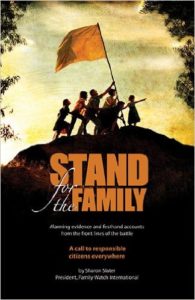 A number of the policy battles Family Watch has fought and won at the United Nations are detailed in the book, “Stand for the Family: A Call to Responsible Citizens Everywhere,” written by FWI president Sharon Slater. Also known as the “family defense handbook,” the book equips concerned citizens and policymakers around the world with knowledge and proven tools, strategies and talking points on a wide variety of critical family issues. It is now in its sixth edition.
A number of the policy battles Family Watch has fought and won at the United Nations are detailed in the book, “Stand for the Family: A Call to Responsible Citizens Everywhere,” written by FWI president Sharon Slater. Also known as the “family defense handbook,” the book equips concerned citizens and policymakers around the world with knowledge and proven tools, strategies and talking points on a wide variety of critical family issues. It is now in its sixth edition.
Featured Video
UN Resource Guide
UN Statements
“Family Watch Right to Life” Comments Submitted to the UN Human Rights Committee”
VIDEO: “The Family and Sustainable Development: Strong Families Prosperous Nations”
UN Reports
Urgent High-level UN Declaration on HIV/AIDS Under Negotiation at UN | June 1, 2021
Report: The UN Commission on Population and Development (CPD54) | May 4, 2021
CSW 65: the Good, the Bad and the Ugly | April 2, 2021
UN Policy Briefs
Binding Obligation of States to Protect the Family. This Policy Brief is a compilation of UN consensus language from binding UN treaties and other important UN documents that shows the obligation of Member States to support and protect the family.
An Analysis of the UN 2030 Sustainable Development Agenda: The Hidden Threats to Life, Family and Children. This analysis of the sustainable development goals (SDGs) and the UN’s 2030 Agenda was created to help UN Member States understand many of the hidden threats contained in the Agenda and to provide suggestions for counteracting these threats.
Threats to National Sovereignty: UN Entities Overstepping Their Mandates. The right of UN Member States to national sovereignty is increasingly being undermined by the actions of rogue UN agencies, Special Rapporteurs and treaty monitoring bodies that are attempting to create new rights to which UN Member States have not consensually agreed.


